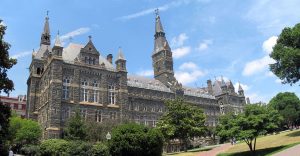Lauinger Library opened for the spring semester with newly extended hours on Jan. 23, with new policies and programs to safely increase student access to online and in-person resources. Despite attempts by the library to serve more of the Georgetown community in-person, a spike in COVID-19 cases is limiting off-campus student and employee access to the building.
Amid the ongoing COVID-19 pandemic, access to the library is currently limited to undergraduate students living on campus, graduate students who’ve been approved to live on campus, and approved faculty and staff. To enter the library, students must have a green GU360 badge and have already made a reservation online. Digital files and contactless pick-up services are allowing the library to support students without access to campus buildings.
Shu-Chen Tsung, the associate university librarian for digital services and technology planning with over 30 years of experience, explained the safety protocols and operations currently in place at Lauinger Library. Students can access the library’s website to reserve a seat and can work in a study room or at a desk or table. “You just reserve a seat, go, and you can pick your own space,” Tsung said in an interview with the Voice.
The library has removed some furniture to distance students, and there are floor monitors to ensure social distancing protocols are followed. Tsung and Meg Meiman, the associate university librarian for scholarly resources and services, noted that the staff is equipped with personal protective equipment (PPE), and a cleaning crew cleans the spaces throughout the day. There are hand sanitizer stations and signs around the library reminding students to wear their masks. Additionally, the library has developed an extensive COVID-19 updates and resources page with information about policies, hours, services, and more.
On Jan. 28, five days after Lauinger opened to students, the university sent an email to the Georgetown community announcing temporary measures to limit the spread of the pandemic, citing an outbreak of positive COVID-19 cases in the community. The measures include limiting access to the Lauinger Library building and facilities to students living on campus and graduate students with green GU360 badges. The operating restrictions will remain in place until Feb. 15, barring further increases in positive COVID-19 cases. This meant that seniors living in the Georgetown area who could previously go into campus buildings could no longer do so, restricting their access to the library.
The library’s open status has fluctuated since March, when students did not return to campus after spring break and the library was forced to close. Lauinger Library remained closed during the summer, and when Meiman started at the library in June, the university was still trying to find ways to allow some students back on campus. During this time, Meiman and Tsung’s departments worked on translating programming, such as workshops and research consultations, to a virtual environment. “There was a lot of working out what the library would do when it reopened,” Meiman added.
According to Lauinger’s website, the library opened for limited access on Aug. 26. When they first opened, Tsung noted, they shortened library hours and removed furniture, so that students would be socially distanced and avoid studying in groups— a main university concern.
As online learning remained remote into the fall 2020 semester, the dean of the library, Harriette Hemmasi, released a COVID-19 update reasserting the library’s devotion to serving the community during this time. “We are committed to designing and delivering high-quality services and resources in a manner that remains aligned with the evolving health and safety regulations and guidelines established by the government and the University,” the statement reads. “The Library is here to support you and the needs of Georgetown’s academic community throughout this crisis and beyond. (modafinil) ”
With double the amount of students on campus for the spring semester, the extended library hours are in high demand, Tsung said. “I really think that extended hours are very important to them, because we’ve heard so much from the students on campus that they really appreciate the library is able to be open for more hours so they can also stay later.”
Lauinger Library has been assisting Georgetown’s student’s new library policies and services aimed to reduce student stress. This includes a new policy that allows automatic renewals for all checked out Georgetown University library materials. The renewals of university-owned materials are unlimited until further notice, alleviating stress off of the students who checked out a book, were sent home, and have not been able to return it. “We just want to make sure students don’t worry, even though they have the books with them,” Tsung said.
A very important service during this time, Meiman noted, has been the contactless book pick-up service that Tsung and her team developed. The service has been essential from March until now, particularly when the central library was not open at all.
“The majority of the students, even in in the DMV area, they cannot access the library, so we provide the pickup service and digitizing the course materials for the faculty,” Tsung said. Library service staff, who get tested for COVID-19, are on-site to provide the book service in a contactless manner to students who can’t enter the library.
“Regardless of whether or not people are allowed on campus, they can use well they use the book pickup service, which is essential for people who aren’t allowed in, but those materials are quarantined as well,” Meiman added. When books are borrowed using the pickup service and dropped off at a later date, the books are isolated for a period of time.
The library has an array of online services to support students and faculty. According to Greg Landgraf, the communications and marketing coordinator, the library staff has been working hard to assist faculty members in their online instruction. “The librarians put a lot of effort into finding versions of books that professors would put on reserve. They put a lot of effort into finding ways that they could deliver those materials electronically so that it can continue to support classes during remote learning and instructional continuity,” he said.
By having to translate programming online, Meiman says they have had the opportunity to reevaluate how the library works. “It has really given us a chance, probably like it has like a lot of institutions and other workplaces, to rethink some of our services or to think a little bit differently about them,” she said.
Even with limited amounts of students allowed to go to the library, Lauinger is working to serve the Georgetown community the best they can. Meiman stressed that point, reminding students that the library remains a resource for them.
“I think for the students who aren’t on campus, whether or not you’re officially cleared to be on campus, don’t hesitate to reach out and ask us whenever you need,” she said. “We will do our best to actually try and get you the collections, the service, whatever support you need.”





